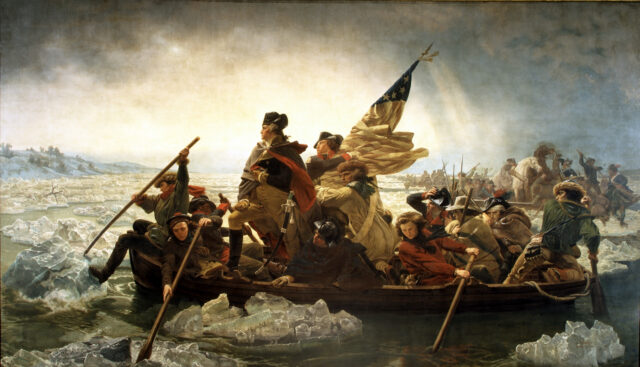In the 2017 movie “Spiderman: Homecoming,” Peter Parker and his classmates take a trip to our nation’s capital and visit the Washington Monument. The female lead, played by Zendaya, hangs back as her friends walk toward the structure, prompting her teacher to ask if she’s “taking it all in.” She responds, “Yeah, I just…I don’t really wanna celebrate something that was built by slaves.” Her teacher, helplessly out of touch, begins to respond, “Oh, I’m sure the Washington Monument wasn’t built by…” but his voice trails off as he catches the eye of a security guard who indicates that, yes, in fact the Washington Monument was built by slaves. A throwaway line to make everyone knowingly laugh.
Except it’s not true. At the time of its construction, the Washington Monument was the tallest building in the world. It was a feat of skilled engineering, not of back-breaking labor. Its stones were cut by expert stonemasons. They were hoisted into place by men operating steam engines. The producers of the film could have seized an opportunity to clear up a toxic misconception about our country — that everything we are and do to this day is tainted by the vast tentacles of the slave power — and still gotten a laugh. Instead, they took an ignorant swipe at America.
Fast forward to responses from the American left to the October 7 Hamas attacks against Israeli civilians. Among the protests and chants and intimidation and vandalism and broken communal alliances, one outrage stood out to me as illustrative of the larger problem: the mid-November rediscovery and approval by young American social media users of Osama Bin Laden’s “Letter to America.”
The letter, published in 2002, was likely written not by Bin Laden, but by an American-born lieutenant of his —an expatriate and traitor named Adam Gadahn. Its first half reads like the litany a freshman sociology major having just read Noam Chomsky would bring to the Thanksgiving table: America is a bad actor in the world. America has supported anti-Muslim atrocities in Israel and the Palestinian territories, in Somalia, Chechnya, Kashmir, Iraq, and elsewhere. America supports Arab and Muslim dictatorships that oppress, humiliate, and impoverish their people. America’s military adventurism has led it to plant unwelcome bases across the Arab and Muslim world. American civilians are an appropriate target because they vote for the politicians who implement the aforementioned policies.
And TikTok users ate it up. “I will never look at this country the same!” “Everything Bin Laden says here is valid!” “My eyes have been opened.” And on and on it went. American kids finding common cause with Osama Bin Laden.
Last summer, the long-running National Assessment for Educational Progress (NAEP)— referred to as “the nation’s report card”—released the latest civics and history test scores for America’s eighth graders. We have been testing students in history every four years since 1994; in civics since 1998. The 2022 results were awful: 13 percent of American eighth graders are proficient or above grade level in history. In civics, only 22 percent scored proficient or above. This is the third quadrennial decline in history scores in a row. But it’s the first ever decline in the civics score.
It is now inescapable that the root of our problem is decay at the core of American self-confidence. Nearly every other dangerous social and political malady traces back to it. We no longer agree on or believe in or understand our history, our Founding principles, or our mission in the world. For generations now, teaching children to be informed patriots has been confused — sometimes purposefully so — with indoctrination or jingoism. This is no longer simply another issue requiring our attention. It is a five-alarm fire burning our country to the ground. It requires immediate mass mobilization.
The problem is, frankly, enormous. It defies the short attention spans that have come to characterize our political and civil institutions. It requires the kind of broad agreement — even to admit the existence of the problem, let alone its scope! — that proves elusive in virtually every other aspect of American life. And we will be opposed every step of the way by well-organized, well-financed, well-credentialed people committed to their narrative and intent on continuing their long march.
Despite these obstacles, we have two very clear advantages. First, Americans still broadly love and respect the country, even if many are hazy as to why they should and increasingly susceptible to arguments that they should not. We have a limited amount of time to capitalize on the still-open door. Second, we’re selling the greatest product ever developed by man: a system of self-government that has resulted in the wealthiest, most powerful, and freest society in human history. Results we can point to.
Much of what has been written in the months since 10/7 has, rightfully, been about the abysmal situation at America’s institutions of higher education. And, without a doubt, there is much to be done on campus. But for the overwhelming majority of Americans who don’t go to college — as well as those who leave their parents’ homes with their civic dispositions and knowledge as mature as they’re likely to get — our attention is sorely needed. So how do we recapture the confidence in America that defined the 20th century?
Patriots on the left and right need to accept that we are now the counterculture and begin behaving accordingly. We need to create and patronize new engines of culture that celebrate and reinforce what is great about America. And we are opposed — sometimes passionately, sometimes passively — by extraordinarily deep pockets and exceptionally talented storytellers and artists. Many of the passive opponents will become allies as soon as we show them there’s money to be made in it; recall the commandeering of hippie culture by corporate America in the late 1960s and early 1970s. Until then, investments need to be made in culture.
But, to start with, we need to reinvigorate and reemphasize teaching US history and civics in American schools. Too few of our fellow citizens know enough about who we are and what we believe to have any confidence when asked to defend it. The claims made by anti-American propagandists may sound wrong to them, but they have no depth of knowledge to back up that feeling.
It is tempting — especially for conservatives, who tend to wrongly believe law can be imposed successfully on culture — to think there is a set of policy solutions that can fix everything. Believing in quick fixes actually undermines the commitment and stamina we need to fight the long battle ahead. In this case, however, there are policies we can pursue that would have immediate benefits. Schools are the low-hanging fruit of this effort precisely because we have a lot of control over what goes on inside them. And while the conservative movement has focused the education policy debate on school choice — a worthy cause, to be sure! — there are a number of other policies we should consider.
Every state has standards for what subject matter is to be taught in what grade. Academic subjects states take seriously — specifically reading and disciplines in the science, technology, engineering, and math (STEM) area — come with state-mandated testing requirements. Very few states test adequately for US history or civics (many states require students to pass a version of the exam given to new American citizens, which is why I use the qualifier “adequately”). State standards, testing, curriculum, and materials are all good ways to signal to classroom teachers what the state expects their students to learn.
But the truth is that, once a child sits down at a desk, the state has very little to say about what goes on at the front of the room. School districts and administrators have more impact. But the real center of gravity is the teacher. The fight for patriotic, content-rich civics and history education is a person-by-person effort to recruit, cultivate, and train expert civics and history teachers. At the policy level, we should concentrate our efforts on creating subject matter expert teachers. Currently, most university schools of education focus their requirements on pedagogy, theory, child development, and similar coursework. But state legislatures can (and should) require a certain percentage of course hours in subject matter content for education degrees to be useful in gaining initial teacher certification.
So, students who want to be math teachers take math classes, students who want to be science teachers take science classes, and, yes, students who want to teach US history take US history classes. Most teachers are eligible to earn an automatic pay increase by returning to school for a master’s degree. Legislatures should tie that reward to learning that focuses on subject matter. All teachers are required periodically to renew their licenses and to take professional development classes toward that end. A high percentage of these courses should focus on a teacher’s subject matter.
There will still be teachers who prefer the 1619 Project’s “systemic racism” perspective and Howard Zinn’s leftist A People’s History of the United States over more appropriate, factual information. There will still be teachers who are highly ideological and resistant to viewpoint diversity. But they will be the exception to the rule. If we accept, as we should, that teachers are — as a group — professionals who want to be good at their jobs, that they have the best academic interests of their students at heart, that most of them are either our sincere allies or potential allies, and (most importantly) that being a well-informed American necessarily increases the odds of developing a deep love of and respect for our country, then content expert teachers should be the primary goal.
The urgent need for a renaissance in teaching America’s founding principles and history has finally risen to broad public consciousness. President Ronald Reagan, as he so often did, saw this problem coming down the road 35 years ago and warned us about it in his farewell address: “if we forget what we did, we won’t know who we are.”
Our mission is to sell the greatest product ever devised by man. Let’s begin acting like it.
Jonathan Greenberg is an ordained Reform rabbi and an advisor to a private family charitable foundation that invests in civic education.






